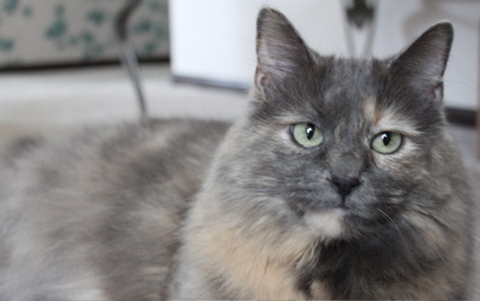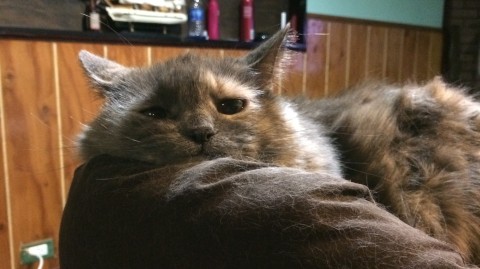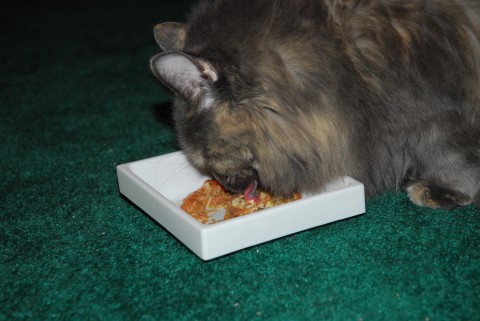Some of us have, or had, cats that we termed “pukers.” These cats are the cats that vomit a few times a week, and we can’t figure out why. Even our vets can’t find a problem: They can’t find blockages; bloodwork and urinalyses are normal, and there’s no evidence of tumors. They just say, “Yep! Looks like you’ve got a puker here.” Did you know, though, that regular vomiting in cats isn’t normal?
We have a cat that we once thought was just a puker. Aria would eat, and sometimes she’d vomit right after eating. Other times, she’d vomit up huge hairballs. She was vomiting several times a week and it was a problem. Our vet looked for everything she could think of, and came up with nothing. Aria seemed healthy. She was just a puker.
She wasn’t losing weight vomiting up all that food, and it didn’t seem to be hurting her any other way, but think about it like this for a moment: Is vomiting that often in the wild really feasible? Is it natural for an animal that has both predators and prey to vomit that much?
Frequent vomiting can be a sign of something serious
Obviously, frequent vomiting can mean something serious. The ASPCA lists these possible causes of frequent vomiting: Colitis, pancreatitis, liver failure, kidney failure, heartworm infection, blockages, and more, are all there. If the frequent vomiting is new, whether your cat has other symptoms as well or not, you should take her to the vet to find out what’s going on.
Regular vomiting in cats isn’t normal, either, though
According to an article on Catster, the American Veterinary Medical Association (AVMA) decided to research regular vomiting in cats by reviewing the cases of a number of cats that were considered pukers. They ran bloodwork, performed various kinds of imaging, and basically, did everything they could think of to find out what, if anything, was wrong with these cats.
They concluded that regular vomiting in cats is not normal, even when it’s all hairballs, and not food. Regular vomiting in cats can be a sign of irritable bowel disease, which is a potentially serious condition for cats.
Furthermore, despite the fact that many of of us have been conditioned to think that regular hairballs are normal, they aren’t, any more than regularly vomiting food is normal. Think about it this way: Cats are designed to swallow a lot of fur. They swallow their own fur all the time, and they will swallow the fur of their prey. Why would they be unable to pass that fur most of the time?
Can regular vomiting in cats be a dietary problem?
The problem for your puker cat may actually be her diet. Lower-quality foods often contain protein rendered from animal parts that are indigestible for humans, and difficult to digest for cats. This can cause regular vomiting in cats.
If your vet has determined this may be the case for your cat, try putting her on a higher quality food, with muscle meat as the main protein source. When you look at the ingredients list in cat food, you should see something like “chicken,” “poultry,” “beef,” etc., as the first ingredient. It should not contain “byproduct.” Find one of these foods, and see if that helps.
Another dietary problem that can cause regular vomiting in cats is food allergies. Rashes, sores and swelling are more common with food allergies, but they can cause vomiting, too. We believe this is what was happening with Aria, and that the grains in regular commercial cat food were the culprit. The reason is not just because she stopped vomiting regularly, but also that she used to suffer from occasional lip swelling, and it was a problem regardless of what bowls we used, what litter we used, basically anything.
We have our cats on a homemade, raw food diet, but this isn’t the only way to stop regular vomiting in cats. It’s just how we did it; Aria now vomits maybe once every six weeks, or less. It’s still a lot more frequently than it should be, but that’s a vast improvement. Her lips also no longer swell up.
It is extremely important that you and your vet rule out medical causes of your cat’s vomiting before you start trying dietary changes to help her. Regular vomiting in cats isn’t normal, but isn’t necessarily dietary, either. It’s also a good idea to work with your vet on dietary changes, once medical problems are ruled out.






The vomit should be checked carefully, many times it can contain round worms, my cat passes hair balls. O yes she prefers Purina Dog chow for a dry treat.
Yes, I agree, the vomit should be checked carefully. It can be worms, or can be a foreign object or three. All of ours pass hairballs, too, but awhile back, Chase was vomiting a couple of times a week. I finally took a dirty fork and picked through it (ew), and it turned out he was eating plastic from various things around the house, so we make sure we keep all plastic out of reach of our cats now.
We feed them all a raw diet, and three of them don’t have hairballs nearly as much as they did before we started the raw diet. Aria used to vomit three to five times a week, with or without fur in it, but on the raw diet, she only vomits once or twice a month. She’s got a sensitive digestive system, as does Kali. But Kali never vomited all that much, even as a tiny little kitten. She’s more prone to diarrhea, but even that’s rare for her now.